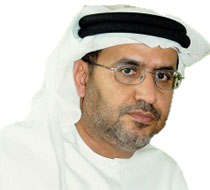
UAE 'leads in energy diversification'
Daegu, South Korea, October 16, 2013
The robust and diverse energy policy of the UAE will ensure that the country remains attractive for foreign investment, said a senior official.
The UAE’s innovative energy policy rests on four pillars: diversification, conservation and efficiency, security of supply and managing talent in the industry, said Undersecretary of Energy Dr Matar Al Niyadi.
He was speaking during a high level panel discussion held at the World Energy Congress (WEC) in Daegu, South Korea.
At a panel entitled, ‘Transition a country in a decade’, Dr Al Niyadi said the country’s approach is geared towards mitigating risk to energy security, future economic prosperity and climate change.
The broader panel discussion addressed the world’s growing need to develop robust strategies to address rapid rises in global energy demands and the need for established hydrocarbon exporters to lead the transition. The panel included Leonhard Birnbaum, vice chair of Europe WEC and member of the executive board, E.ON, Germany; Makoto Yagi, president, Kansai Power Company Japan; and Gudni Johannesson; chair of Icelandic National Member Committee.
Highlighting the UAE’s regional leadership role in the adoption of clean energy, Dr Al Niyadi said: “Diversifying our energy mix is the first pillar of our energy policy. To meet immediate demands, we are using more natural gas to generate electricity, because of its clean and efficient burning properties.
“In December 2009, we awarded a $20 billion contract to the Korea Electric Power Corporation to construct four nuclear reactors. To be completed by 2020, this will cover about 25 per cent of the UAE demand for electricity.”
He also highlighted the important role of renewables: “The UAE was the first country in the Middle East to announce renewable energy targets, which will see 2.5 GW of new renewable energy capacity by 2030. We expect these targets to be met with solar, and waste-to-energy and as a major first step, Masdar commissioned Shams 1 in March this year – the largest concentrated solar power plant in the world.”
On the UAE’s conservation and efficiency policies, Dr. Al Niyadi said: “Enhancing energy efficiency and our conservation efforts to cut domestic demand and prevent wasteful practices is critical.
“In the UAE, we have the region’s first mandatory green building codes, leading to cuts in energy and water consumption by more than 33 per cent in new buildings. More appliances will soon fall under regulation. We are also running a large number of pilot schemes in order to develop additional policies in the next few years, including monitoring of water and energy consumption through wireless smart meters, testing of consumption and time-of-day based electricity pricing to offer lower rates for less electricity usage and the establishment of state-funded energy service companies.”
On energy security, Dr Al Niyadi said the UAE is investing heavily in its natural gas supplies as the country prepares to utilise gas as a primary source of power generation.
“We are spending $25 billion within the next five years on exploring new gas fields using the latest technology to develop non-associated gas at onshore old oilfields,” said Al Niyadi. “Al-Hosn, a joint venture between Adnoc and Occidental, is set to develop the Shah sour gas field which is expected to add 500 million cubic feet of gas per day to the domestic supply by 2014.
“Simultaneously, we are sealing long term arrangements with Qatar to import gas via the Dolphin Energy pipeline, which helps the UAE to meet around 30 per cent of its local demand for natural gas. And we are working towards constructing a second LNG terminal on the eastern coast of the UAE with a capacity of nine million tonnes per year.” – TradeArabia News Service







